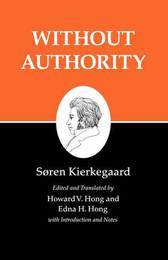
|
Kierkegaard's Writings, XVIII, Volume 18: Without Authority
Paperback / softback
Main Details
| Title |
Kierkegaard's Writings, XVIII, Volume 18: Without Authority
|
| Authors and Contributors |
By (author) Soren Kierkegaard
|
|
Edited and translated by Howard V. Hong
|
|
Edited and translated by Edna H. Hong
|
| Series | Kierkegaard's Writings |
|---|
| Physical Properties |
| Format:Paperback / softback | | Pages:320 | | Dimensions(mm): Height 216,Width 140 |
|
| Category/Genre | Western philosophy - c 1600 to c 1900 |
|---|
| ISBN/Barcode |
9780691140797
|
| Classifications | Dewey:198.9 |
|---|
| Audience | | Tertiary Education (US: College) | | Professional & Vocational | |
|---|
| Illustrations |
5 halftones 1 table
|
|
Publishing Details |
| Publisher |
Princeton University Press
|
| Imprint |
Princeton University Press
|
| Publication Date |
25 October 2009 |
| Publication Country |
United States
|
Description
"Without authority," a phrase Kierkegaard repeatedly applied to himself and his writings, is an appropriate title for this volume of five short works that in various ways deal with the concept and practice of authority. The Lily in the Field and the Bird of the Air contemplates the teaching authority of these creatures based on three different passages in the Gospels. The first of Two Ethical-Religious Essays mediates on the ethics of Jesus' martyrdom; the second contrasts the authority of the genius with that of the apostle. The remaining works--Three Discourses at the Communion on Fridays (1849), An Upbuilding Discourse (1850), and Two Discourses at the Communion on Fridays (1851)--are meditations on sin, forgiveness, and the power of love.
Author Biography
Howard V. Hong, the former Director of the Howard and Edna Hong Kierkegaard Library at St. Olaf College, is the General Editor of Kierkegaard's Writings. Edna H. Hong is a poet, writer, and translator who has collaborated with Professor Hong on other English translations of Kierkegaard's works.
Reviews"These new translations are excellent."--Choice "The definitive edition of the Writings. The first volume ... indicates the scholarly value of the entire series: an introduction setting the work in the context of Kierkegaard's development; a remarkably clear translation; and concluding sections of intelligent notes."--Library Journal
|